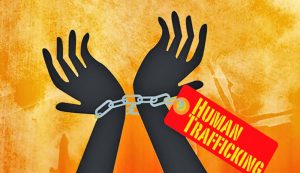Home News Corruption in Police Force hinders anti-TIP efforts – US report
… as Guyana climbs to Tier 1
Guyana can now boast as a country that has made headway in the fight against Trafficking in Persons (TIP), according to the newly released US State Department Trafficking in Persons 2017 Report. The report bumps Guyana from Tier 2 to Tier 1 on the TIP Index.
The upgrade means that the country have been able to implement the recommendations made in the 2016 report and satisfied the minimum requirements of the United States’ Trafficking Victims Protection Act.
Guyana is a source and destination country for men, women, and children subjected to sex trafficking and forced labour in mining, agriculture, forestry, domestic service and shops. The report stated that for the past five years women and children from Guyana, Brazil, The Dominican Republic, Suriname, and Venezuela are subjected to sex trafficking in mining communities in the interior and urban areas.
subjected to sex trafficking and forced labour in mining, agriculture, forestry, domestic service and shops. The report stated that for the past five years women and children from Guyana, Brazil, The Dominican Republic, Suriname, and Venezuela are subjected to sex trafficking in mining communities in the interior and urban areas.
It also identifies that while both sex trafficking and forced labour occurs in interior mining communities, limited Government presence in those areas makes the extent of trafficking unknown. It added that corruption within the Police Force also hinders anti-trafficking efforts.
The Social Protection Ministry has been the lead agency responsible for tackling trafficking and overseeing the work of the Anti-Trafficking Unit (ATU). The Government was commended on the establishment of the inter-ministerial taskforce, which in collaboration with various stakeholders coordinated several successful anti-trafficking operations. In 2016, the Government reported 19 trafficking investigations, 19 prosecutions, and two convictions; compared to 15 trafficking investigations, seven prosecutions, and one conviction in 2015, and seven investigations, four prosecutions, and one conviction in 2014.
While the report notes the accomplishments, it also identifies Government’s failure to increase protection and services for victims outside of Georgetown as well as the provision of adequate protection and shelter for child and male victims.
“The Government reported identifying 98 trafficking victims in 2016 (80 for sex trafficking and 18 for labour trafficking), compared with 56 in 2015. An NGO reported the Government referred 40 victims to shelter and psycho-social services in 2016, compared with 17 victims in 2015,” the report stated.
The Government signed a Memorandum of Understanding (MoU) with an anti-trafficking non-governmental organisation (NGO) during the previous reporting period and committed public funding for the provision of enhanced psychosocial services to adult female trafficking victims referred by the Government. However, the Government never honoured its commitment; rather it gave $13 million to another NGO that provided housing and counselling services to victims of gender-based violence, including an unknown number of trafficking victims, the report highlighted.
Guyana was put in the spotlight for its lack of adequate public or private shelters for male or child trafficking victims, despite the Government’s commitment, made in early 2016, to open and partially fund a shelter for male victims. Child trafficking victims are placed in nonspecialised shelters, and child victims identified in rural areas were placed in holding cells overnight without food before being transferred to the capital for shelter.
Recommendations
In order to become fully prepared to tackle TIP, several initiatives have to be taken. The report recommends the funding of specialised victim services; vigorously investigate and prosecute sex and labour trafficking cases; train law enforcement, judiciary officials, and frontline responders – especially those working outside the capital – on victim identification and referral procedures and finalise the written identification procedures to better guide law enforcement officials.
It also recommends Guyana provide additional protection for victims to enable them to testify against traffickers in a way that minimizes re-traumatisation; record the number of cases reported to the trafficking hotline to promote a rapid investigative and victim assistance response; and provide training for diplomatic personnel on human trafficking.
 subjected to sex trafficking and forced labour in mining, agriculture, forestry, domestic service and shops. The report stated that for the past five years women and children from Guyana, Brazil, The Dominican Republic, Suriname, and Venezuela are subjected to sex trafficking in mining communities in the interior and urban areas.
subjected to sex trafficking and forced labour in mining, agriculture, forestry, domestic service and shops. The report stated that for the past five years women and children from Guyana, Brazil, The Dominican Republic, Suriname, and Venezuela are subjected to sex trafficking in mining communities in the interior and urban areas.










